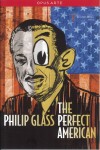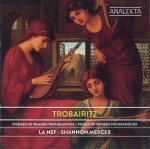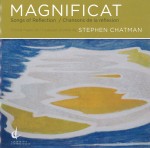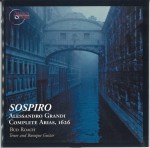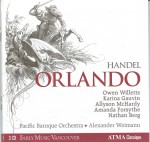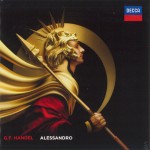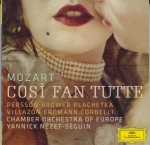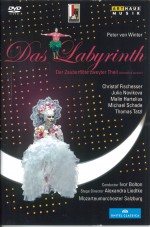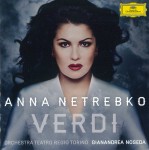 Verdi
Verdi
Anna Netrebko; Orchestra Teatro Regio Torino; Gianandrea Noseda
Deutsche Grammophon 4791052
The Verdi Album
Jonas Kaufmann; Orchestra dell’Opera di Parma; Pier Giorgio Morandi
Sony Classical 88765492042
Domingo/Verdi
Placido Domingo; Orquestra do la Comunitat Valenciana; Pablo Heras-Casado
Sony 88883733122
The music of Verdi, nearly 200 years on is still the litmus test of opera singers of the 21st century.
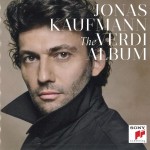 It is something to be graduated to, something that reveals the true mettle of contenders and something that strikes fear in the hearts of those singers. Let’s call it a rite of passage for the vocalists. One of the reasons, but by no means the only one, is the fact that Verdi always wrote for the divas (and divos) of the day — singers blessed with that extra high E, smoother coloratura and a more dramatic glissando. Unlike the masters of Bel Canto, there was nothing superfluous in Verdi’s writing, no extra trills to enhance the experience. Instead, the full vocal range was exploited and the dramatic range of the performers was used to the fullest effect. These days, the Verdi repertoire is not only the most consistently performed on the world stage, but also what separates the wheat from the chaff. When it comes to the female voice, Verdi demands a full soprano, somewhere between the lyric and dramatic, and as for tenors, well, they need to be “helden tenors” with power to spare.
It is something to be graduated to, something that reveals the true mettle of contenders and something that strikes fear in the hearts of those singers. Let’s call it a rite of passage for the vocalists. One of the reasons, but by no means the only one, is the fact that Verdi always wrote for the divas (and divos) of the day — singers blessed with that extra high E, smoother coloratura and a more dramatic glissando. Unlike the masters of Bel Canto, there was nothing superfluous in Verdi’s writing, no extra trills to enhance the experience. Instead, the full vocal range was exploited and the dramatic range of the performers was used to the fullest effect. These days, the Verdi repertoire is not only the most consistently performed on the world stage, but also what separates the wheat from the chaff. When it comes to the female voice, Verdi demands a full soprano, somewhere between the lyric and dramatic, and as for tenors, well, they need to be “helden tenors” with power to spare.
The current reigning diva of the Met, Anna Netrebko, having wrestled the mantle from Angela Gheorghiu, has finally released her first Verdi album. The thoughtful selections, from Macbeth to Giovanna d’Arco, Don Carlo and Il Trovatore, take her voice through some major hoops, showing the growing confidence of the Russian soprano. She truly is the “prima donna assoluta” however much one may hate such superficial judgments. In perfect command of her voice, Netrebko does justice to all her predecessors, Verdi’s favourite divas: Erminia Frezzolini, Marianna Barbieri-Nini, Rosina Penco and Sophie Cruvelli. A graduation from the lighter Puccini and verismo roles bodes well for the soprano’s future both at the Met and in the recording studio.
Jonas Kaufmann, surely the brightest star of the new generation of tenors, comes to the music of Verdi from a point of reverence. His lovely voice, so effective in his native tongue in the renditions of Schubert, Mahler and Mozart, at first seems intimidated by the Verdi repertoire. The culprit, I presume, is his knowledge of Verdi’s arias in German at first, making a transition to Italian that much more difficult. Fortunately once he gets through his initial jitters he proves once again that he is the one to watch, exuding both confidence and the bravado necessary to dominate the stage in Verdi productions of the future.
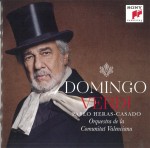 Placido Domingo could have easily succumbed to the “superstar syndrome” so readily embodied by the late Luciano Pavarotti: sing it all, sing it badly (or at least too long) and damn the torpedoes. Instead, Domingo carefully observes the changes to his voice over the decades, moving his repertoire down his range, tackling the baritone with some tenor flourishes. Not having heard him live in over five years, I cannot vouch for this voice outside the recording studio, but here it sounds as though Domingo is in full control of his abilities, beautifully navigating the treacherous waters of Verdi’s writing. He may be the lion in winter, but his roar still sends shivers down the spine.
Placido Domingo could have easily succumbed to the “superstar syndrome” so readily embodied by the late Luciano Pavarotti: sing it all, sing it badly (or at least too long) and damn the torpedoes. Instead, Domingo carefully observes the changes to his voice over the decades, moving his repertoire down his range, tackling the baritone with some tenor flourishes. Not having heard him live in over five years, I cannot vouch for this voice outside the recording studio, but here it sounds as though Domingo is in full control of his abilities, beautifully navigating the treacherous waters of Verdi’s writing. He may be the lion in winter, but his roar still sends shivers down the spine.
The good news in all this is that the music of Verdi has a most competent cast of characters, both young and old, beautifully bringing the music of the Italian master to our ears on the 200th anniversary of his birth!
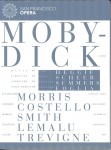 Jake Heggie – Moby-Dick
Jake Heggie – Moby-Dick

